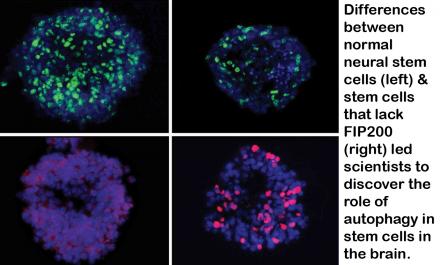are essential for any of our researchers trying to create neuronal stem cells for our brains.
http://www.uofmhealth.org/news/archive/201304/spring-cleaning-your-brain-u-m-stem-cell-research-shows-how
Deep inside your brain, a legion of stem cells lies ready to turn into new brain and nerve cells whenever and wherever you need them most. While they wait, they keep themselves in a state of perpetual readiness – poised to become any type of nerve cell you might need as your cells age or get damaged.

In a paper published online in Nature Neuroscience, the U-M team shows that a particular protein, called FIP200, governs this cleaning process in neural stem cells in mice. Without FIP200, these crucial stem cells suffer damage from their own waste products -- and their ability to turn into other types of cells diminishes.
It is the first time that this cellular self-cleaning process, called autophagy, has been shown to be important to neural stem cells.
The findings may help explain why aging brains and nervous systems are more prone to disease or permanent damage, as a slowing rate of self-cleaning autophagy hampers the body’s ability to deploy stem cells to replace damaged or diseased cells. If the findings translate from mice to humans, the research could open up new avenues to prevention or treatment of neurological conditions.
In a related review article just published online in the journal Autophagy, the lead U-M scientist and colleagues from around the world discuss the growing evidence that autophagy is crucial to many types of tissue stem cells and embryonic stem cells as well as cancer stem cells.
As stem cell-based treatments continue to develop, the authors say, it will be increasingly important to understand the role of autophagy in preserving stem cells’ health and ability to become different types of cells.
“The process of generating new neurons from neural stem cells, and the importance of that process, is pretty well understood, but the mechanism at the molecular level has not been clear,” says Jun-Lin Guan, Ph.D., the senior author of the FIP200 paper and the organizing author of the autophagy and stem cells review article. “Here, we show that autophagy is crucial for maintenance of neural stem cells and differentiation, and show the mechanism by which it happens.”
No comments:
Post a Comment